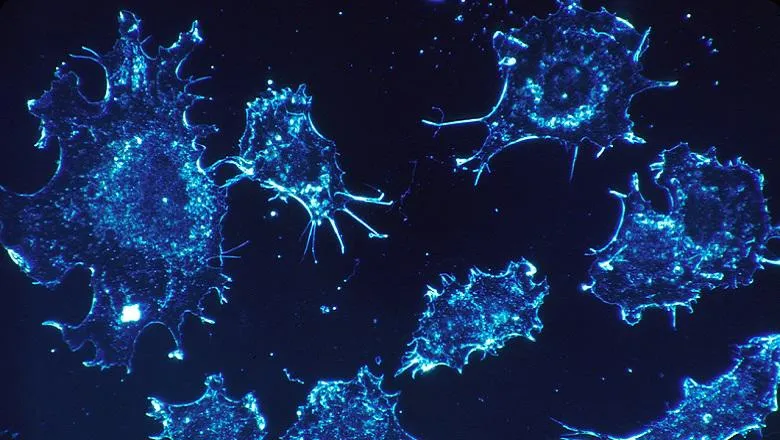Monoclonal antibodies represent a well-established platform to combat cancer. Until recently only those of the IgG class have been employed for cancer immunotherapy. Our group has recognised that IgE antibodies, well known for their pathogenic roles in allergic disease, may offer multiple advantages over those conferred by IgG in treating solid malignancies, by activating the patient’s immune cells against cancer.
Sophia N. Karagiannis, Professor of Translational Cancer Immunology and Immunotherapy from the School of Basic & Medical Biosciences
14 June 2021
Genetically modified antibody and cell therapies directed against SLC3A2 safely target tumours
Immune-activating antibody and genetically modified cell therapies targeting the cancer antigen SLC3A2 can safely target tumours, finds a new study.

Researchers engineered IgE and CAR T cell immunotherapies, derived from the murine monoclonal antibody SF-25, to evaluate potential for cancer therapy. Their aim was to create cancer specific immunotherapies preferentially killing cancer cells and avoiding healthy human tissue.
The antibody SF-25 was known to demonstrate cancer specific binding across a range of human cancers, but the target of SF-25 was not known. Using a combination of high throughput technologies researchers at King’s, alongside support by Guy’s and St Thomas’ Biomedical Research Centre, Mount Sinai Hospital, University of Toronto, Canada, NIH, Bethesda, USA, and Aulesa Biosciences Ltd UK, identified SLC3A2 as the target.
The IgE antibody was found to restrict tumour growth in mice and did not trigger basophil activation, which is normally a sign of allergic reaction, suggesting safe administration. The CAR T cell demonstrated cytotoxicity of cancer cells, reduced growth of human tumours and ‘tunability’.
This innovative research was a cross departmental collaboration between St. John’s Institute of Dermatology at the School of Basic and Medical Biosciences and the School of Cancer and Pharmaceutical Sciences, at the Faculty of Life Sciences and Medicine.
She added: “We set out to determine whether IgE antibodies are also effective for targeting different cancers and this new study supports our hypothesis. Furthermore, our combined King’s expertise alongside that of our collaborators, offers a novel approach to identifying target proteins for an antibody with unknown antigen specificity.”
Dr Sophie Papa, Clinical Reader in Immuno-oncology from the School of Cancer & Pharmacetical Sciences said: “Immune therapies are now making an increasing impact on cancer treatment. In recent years, CAR T Cell therapy has primarily been used to treat blood cancers. Our research indicates applicability to a wider range of cancers including breast, prostate, melanoma and colorectal.”
“Cancer immunotherapy with monoclonal antibodies and (CAR) T cell therapies can benefit from selection of new targets with high levels of tumour specificity and from early assessments of efficacy and safety to de-risk potential therapies.”
